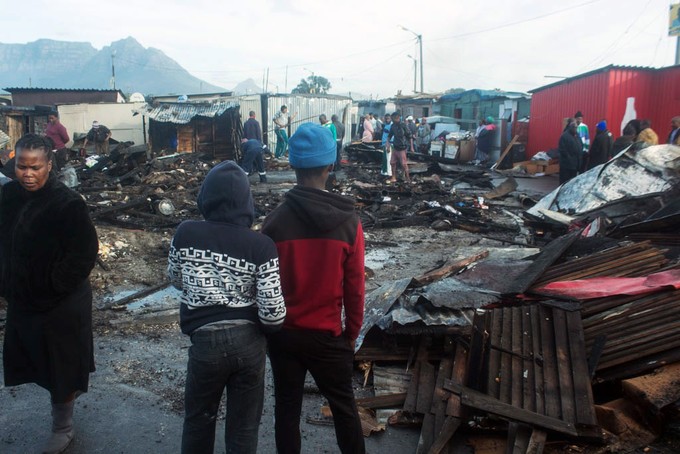Langa shack fire may have started because man tried to keep warm
“This is the third time that I have lost my shack to a fire. Everything of mine is destroyed.” - resident
About 17 shacks were destroyed in a fire in Langa’s Zone 24 this morning, leaving more than 30 residents homeless.
The cause of the fire, which started at about 5:30am, is not yet certain. However, over a dozen residents told us it was started when a man lit a fire in his shack to keep warm, because he had no electricity.
When GroundUp arrived on the scene people who had lost their homes were cleaning up and looking for things that could be salvaged. Burnt clothes and burnt shoes could be seen lying in the ashes.
One of the victims, Sithembele Loliwe, whose shack burnt down, said he was not home when the fire started but when he arrived after the firefighters had put the fire out, he managed to save his bed and a coffee table.
Resident Noshumi Petse said: “We got woken up by someone screaming that there was a fire. We tried to save our things but it was too late. The fire was too strong and the only thing we could do was to get out and get to safety. This is the third time that I have lost my shack to a fire. Everything of mine is destroyed, including my children’s school clothes and books. My child who is doing Grade 12 did not attend school today because of the fire.”
Ward councillor, Samkelo John, who was also on the scene said fires were frequent in Zone 24 and 20. He said that a few months ago a number of shacks were burnt down after a resident had fallen asleep while cooking and left the stove on. “Disaster risk management was here earlier to assess the situation and they said they would be back to help out,” said John.
© 2016 GroundUp. 
This article is licensed under a Creative Commons Attribution-NoDerivatives 4.0 International License.
You may republish this article, so long as you credit the authors and GroundUp, and do not change the text. Please include a link back to the original article.



